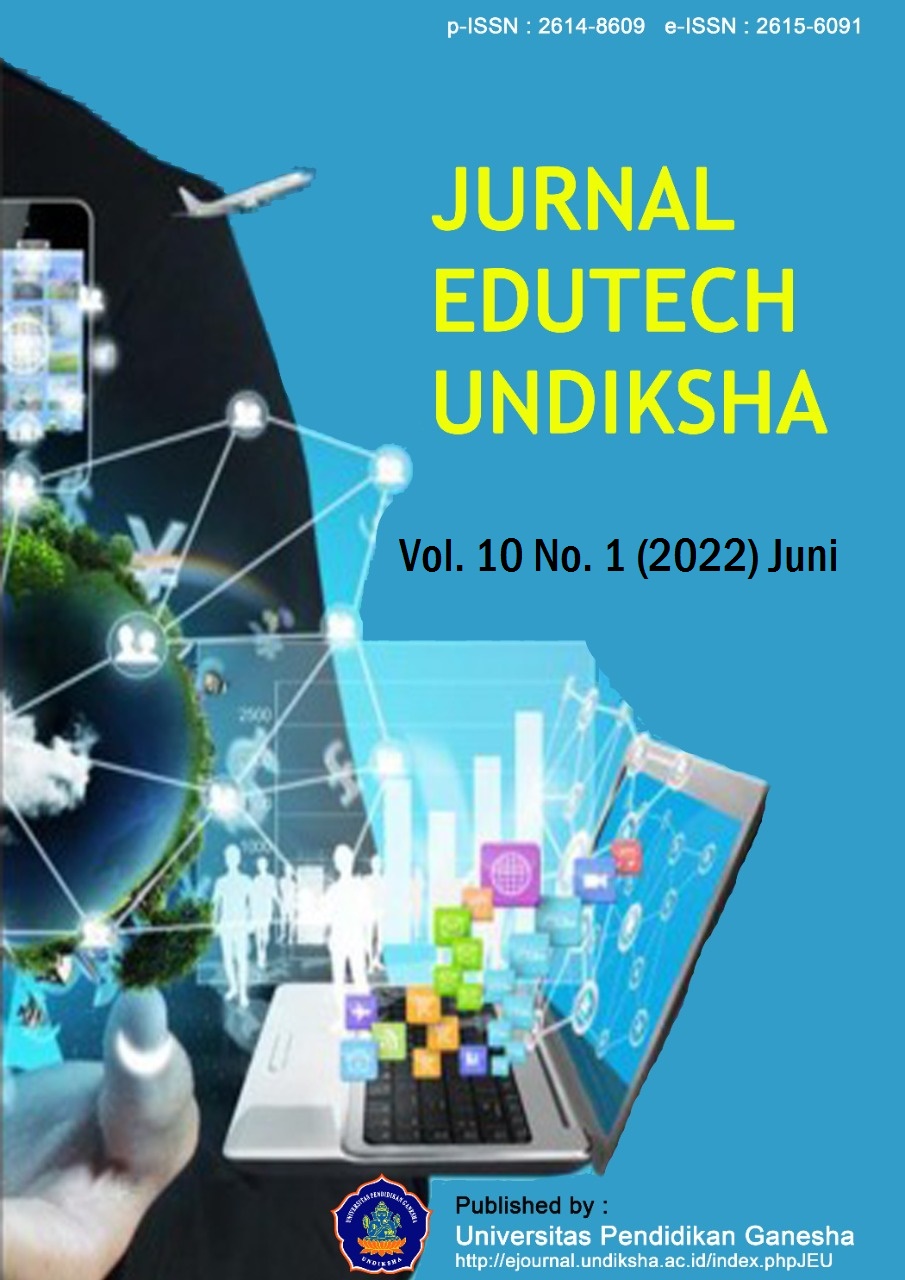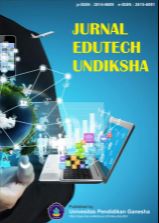Meningkatkan Motivasi dan Hasil Belajar Mata Pelajaran Seni Budaya Melalui E-Modul
DOI:
https://doi.org/10.23887/jeu.v10i1.44495Kata Kunci:
E-modul, Motivasi Belajar, Model PengembanganAbstrak
Penelitian ini berfokus terhadap permasalahan pembelajaran yang masih bersifat konvensional ditandai dengan rendahnya motivasi dan hasil belajar siswa pada mata pelajaran seni budaya. Untuk itu, diperlukan adanya pembelajaran inovatif yang dapat meningkatkan motivasi siswa dalam belajar. Penelitian ini bertujuan untuk meningkatkan motivasi belajar siswa melalui pengembangan e-modul. Subjek penelitian yaitu 1 orang ahli isi mata pelajaran, 1 orang ahli desain pembelajaran, 1 orang ahli media pembelajaran, 3 siswa untuk uji coba perorangan, dan 9 siswa untuk uji coba kelompok kecil. Metode pengumpulan data yang digunakan yaitu observasi, wawancara, dan kuesioner. Teknik analisis data yang digunakan yaitu analisis deskriptif kualitatif dan deskriptif kuantitatif. Hasil penelitian menunjukkan bahwa e-modul yang dikembangkan dinyatakan valid dengan masing-masing penilaian: (a) hasil review ahli isi mata pembelajaran (98,46%), (b) hasil review ahli desain (96%), (c) hasil review ahli media (90%), (d) hasil uji coba perorangan (95,53%), dan hasil uji coba kelompok kecil (91,84%). Berdasarkan hal tersebut, dapat disimpulkan bahwa penggunaan e-modul dapat meningkatkan motivasi belajar seni budaya siswa kelas VIII.
Referensi
Agung, A. A. G. (2017). Metodologi Penelitian Kuantitatif (Perspektif Manajemen Pendidikan). Universitas Pendidikan Ganesha.
Anif, S., Sutopo, A., & Prayitno, H. J. (2020). Lesson Study Validation: Model for Social and Natural Sciences Teacher Development in The Implementation of National Curriculum in Muhammadiyah Schools, Indonesia. Universal Journal of Educational Research, 8(1), 253–259. https://doi.org/10.13189/ujer.2020.080132.
Ansyari, M. F. (2018). Developing A Rubric for Assessing Pre-Service English Teacher Struggles with Instructional Planning. Cogent Education, 5(1). https://doi.org/10.1080/2331186X.2018.1507175.
Arif, & Yeniawati. (2018). Pengantar Desain Pembelajaran. Jambi: Pustaka Ma’Arif Press.
Aryawan, R., Sudatha, I. G. S., & Sukmana, A. I. W. I. Y. (2018). Pengembangan E-Modul Interaktif Mata Pelajaran IPS di SMP Negeri 1 Singaraja. Jurnal Edutech Undiksha, 6(2), 180–191. https://ejournal.undiksha.ac.id/index.php/JEU/article/view/20290.
Asrial, A., Syahrial, S., Maison, M., Kurniawan, D. A., & Piyana, S. O. (2020). Ethnoconstructivism E-Module To Improve Perception, Interest, and Motivation of Students in Class V Elementary School. JPI (Jurnal Pendidikan Indonesia), 9(1), 30. https://doi.org/10.23887/jpi-undiksha.v9i1.19222.
Astra, I. M., Raihanati, R., & Mujayanah, N. (2020). Development of Electronic Module Using Creative Problem-Solving Model Equipped with Hots Problems on The Kinetic Theory of Gases Material. Jurnal Penelitian & Pengembangan Pendidikan Fisika, 6(2), 181–194. https://doi.org/10.21009/1.06205.
Boangmanalu, D., Jampel, I. N., & Suwatra, I. I. W. (2018). Pengembangan Media Komik dengan Model Hannafin dan Peck pada Mata Pelajaran IPS Kelas V SD Negeri 4 Kampung Baru Tahun 2017 / 2018. Jurnal Edutech Undiksha, 6(2), 170–179. https://ejournal.undiksha.ac.id/index.php/JEU/article/view/20288.
Canboy, B., Montalvo, A., Buganza, M. C., & Emmerling, R. J. (2016). ‘Module 9’: A New Course to Help Students Develop Interdisciplinary Projects Using The Framework of Experiential Learning Theory. Innovations in Education and Teaching International, 53(4), 445–457. https://doi.org/10.1080/14703297.2014.975150.
Coles, A. (2019). Facilitating The Use of Video with Teachers of Mathematics: Learning from Staying with The Detail. International Journal of STEM Education, 6(5). https://doi.org/10.1186/s40594-018-0155-y.
Darmaji, Astalini, Kurniawan, D. A., Parasdila, H., Iridianti, Susbiyanto, Kuswanto, & Ikhlas, M. (2019). E-Module Based Problem Solving in Basic Physics Practicum for Science Process Skills. International Journal of Online and Biomedical Engineering, 15(15), 4–17. https://doi.org/10.3991/ijoe.v15i15.10942.
Dong, C., Cao, S., & Li, H. (2020). Young Children’s Online Learning During COVID-19 Pandemic: Chinese Parents’ Beliefs and Attitudes. Children and Youth Services Review, 118(August), 105440. https://doi.org/10.1016/j.childyouth.2020.105440.
Fatmala, N. E., Nyeneng, I. D. P., & Suana, W. (2017). Pengembangan Modul Kontekstual Berbasis Multirepresentasi pada Materi Hukum Newton tentang Gravitasi. Jurnal Pembelajaran Fisika, 5(4). http://jurnal.fkip.unila.ac.id/index.php/JPF/article/view/13141/9439.
Febriani, C. (2017). Pengaruh Media Video terhadap Motivasi Belajar dan Hasil Belajar Kognitif Pembelajaran IPA Kelas V Sekolah Dasar. Jurnal Prima Edukasia, 5(1), 11–21. https://doi.org/10.21831/jpe.v5i1.8461.
Fisnani, Y., Utanto, Y., & Ahmadi, F. (2020). The Development of E-Module for Batik Local Content in Pekalongan Elementary School. Innovative Journal of Curriculum and Educational Technology, 9(1), 40–47. https://doi.org/10.15294/IJCET.V9I1.35592.
Gellerstedt, M., Babaheidari, S. M., & Svensson, L. (2018). A First Step towards A Model for Teachers’ Adoption of ICT Pedagogy in Schools. Heliyon, 4(9), 786. https://doi.org/10.1016/J.HELIYON.2018.E00786.
Habidah, M. (2020). Pengembangan E-Modul Berbasis Pendekatan Saintifik pada Mata Pelajaran Marketing Kompetensi Dasar Menganalisis Segmentasi Pasar di Kelas X SMK Negeri 1 Jombang. Jurnal Pendidikan Tata Niaga, 8(3), 972–978. https://ejournal.unesa.ac.id/index.php/jptn/article/view/40004.
Hamid, S. N. M., Lee, T. T., Taha, H., Rahim, N. A., & Sharif, A. M. (2021). E-Content Module for Chemistry Massive Open Online Course (Mooc): Development and Students’ Perceptions. Journal of Technology and Science Education, 11(1), 67–92. https://doi.org/10.3926/jotse.1074.
Hamzah, I., & Mentari, S. (2017). Development of Accounting E-Module to Support the Scientific Approach of Students Grade X Vocational High School. Journal of Accounting and Business Education, 2(1), 78–86. https://doi.org/10.26675/jabe.v1i1.9751.
Hermanto, Y. B., & Srimulyani, V. A. (2021). The Challenges of Online Learning During the Covid-19 Pandemic. Jurnal Pendidikan Dan Pengajaran, 54(1), 46–57. http://repositori.ukdc.ac.id/id/eprint/833.
Irwansyah, F. S., Lubab, I., Farida1, I., & Ramdhani, and M. A. (2017). Designing Interactive Electronic Module in Chemistry Lessons. International Conference on Mathematics and Science Education (ICMScE), 895. https://doi.org/10.1088/1742-6596/895/1/012009.
Ismawati, M., Tegeh, I. M., & Jampel, I. N. (2018). Pengembangan Modul Berorientasi Pendidikan Karakter pada Mata Pelajaran IPS Siswa Kelas VII Semester Ganjil Tahun Pelajaran 2018/2019 di SMP Muhammadiyah 2 Singaraja. Jurnal Edutech Undiksha, 6(2), 278–284. https://doi.org/10.23887/jeu.v6i2.20322.
Khan, M. A., Vivek, Nabi, M. K., Khojah, M., & Tahir, M. (2021). Students’ Perception towards E-Learning During Covid-19 Pandemic in India: An Empirical Study. Sustainability, 13(1). https://doi.org/10.3390/su13010057.
Kismiati, D. (2020). Implementasi E-Modul Pengayaan Isolasi dan Karakterisasi Bakteri dalam Meningkatkan Kemandirian Belajar Siswa SMA. Jurnal Pendidikan Biologi, 1(1), 1–10. https://doi.org/10.35719/alveoli.v1i1.1.
Komikesari, H., Mutoharoh, M., Dewi, P. S., Utami, G. N., Anggraini, W., & Himmah, E. F. (2020). Development of E-Module Using Flip PDF Professional on Temperature and Heat Material. Journal of Physics: Conference Series, 1572(1). https://doi.org/10.1088/1742-6596/1572/1/012017.
Kurniasari, F. (2017). Implementasi Pendekatan Saintifik pada Penugasan Aktivitas di Buku Teks Bahasa Indonesia Kelas VII SMP Berdasarkan Kurikulum 2013. Jurnal Pendidikan Edutama, 4(1), 9–26. https://www.ejurnal.ikippgribojonegoro.ac.id/index.php/JPE/article/view/44.
Lange, C., & Costley, J. (2020). Improving Online Video Lectures: Learning Challenges Created by Media. International Journal of Educational Technology in Higher Education 2020 17:1, 17(1), 1–18. https://doi.org/10.1186/S41239-020-00190-6.
Linda, R., Zulfarina, Mas’ud, & Putra, T. P. (2021). Peningkatan Kemandirian dan Hasil Belajar Peserta Didik Melalui Implementasi E-Modul Interaktif IPA Terpadu Tipe Connected pada Materi Energi SMP/MTs. Jurnal Pendidikan Sains Indonesia, 9(2), 191–200. https://doi.org/10.24815/jpsi.v9i2.19012.
Liu, X., Kong, J., Jiang, M., & Li, S. (2021). Interactive Information Module for Person Re-Identification. Journal of Visual Communication and Image Representation, 75. https://doi.org/10.1016/j.jvcir.2021.103033.
Lubis, M. (2020). Peran Guru pada Era Pendidikan 4.0. EDUKA : Jurnal Pendidikan, Hukum, Dan Bisnis, 4(2). https://doi.org/10.32493/eduka.v4i2.4264.
Meyera, O. A., Omdahlb, M. K., & Guido, M. (2019). Investigating The Effect of Pre-Training When Learning through Immersive Virtual Reality and Video A Media and Methods Experiment | Elsevier Enhanced Reader. Computers & Education, 140, 1–17. https://doi.org/10.1016/j.compedu.2019.103603.
Mulyani, F., & Haliza, N. (2021). Research & Learning in Faculty of Education Analisis Perkembangan Ilmu Pengetahuan dan Teknologi ( Iptek ) Dalam Pendidikan. 3(1), 101–109. https://doi.org/10.31004/jpdk.v3i1.1432.
Muyaroah, S., & Fajartia, M. (2017). Pengembangan Media Pembelajaran Berbasis Android Menggunakan Aplikasi Adobe Flash Cs 6 pada Mata Pelajaran Sosiologi. Edutainment, 8(1), 27–38. https://doi.org/10.35438/e.v8i1.221.
Ningsih, S. Y., & Mahyuddin, N. (2021). Desain E-Module Tematik Berbasis Kesantunan Berbahasa Anak Usia Dini di Taman Kanak-Kanak. Jurnal Obsesi : Jurnal Pendidikan Anak Usia Dini, 6(1), 137–149. https://doi.org/10.31004/obsesi.v6i1.1217.
Oktavian, R., & Aldya, R. F. (2020). Efektivitas Pembelajaran Daring Terintegrasi di Era Pendidikan 4.0. Didaktis: Jurnal Pendidikan Dan Ilmu Pengetahuan, 20(2), 129–135. https://doi.org/10.30651/didaktis.v20i2.4763.
Oktaviara, R. A., & Pahlevi, T. (2019). Pengembangan E-Modul Berbantuan Kvisoft Flipbook Maker Berbasis Pendekatan Saintifik pada Materi Menerapkan Pengoperasian Aplikasi Pengolah Kata Kelas X OTKP 3 SMKN 2 Blitar Rhesta Ayu Oktaviara Triesninda Pahlevi. Jurnal Pendidikan Perkantoran, 07(03), 60–65. https://ejournal.unesa.ac.id/index.php/JPAPUNESA/article/view/29542.
Perdana, F. A., Sarwanto, S., Sukarmin, S., & Sujadi, I. (2017). Development of E-Module Combining Science Process Skills and Dynamics Motion Material to Increasing Critical Thinking Skills and Improve Student Learning Motivation Senior High School. International Journal of Science and Applied Science: Conference Series, 1(1), 45–54. https://doi.org/10.20961/ijsascs.v1i1.5112.
Puspitasari, A. D. (2019). Penerapan Media Pembelajaran Fisika Menggunakan Modul Cetak dan Modul Elektronik pada Siswa SMA. Jurnal Pendidikan Fisika, 7(1), 17–25. https://core.ac.uk/download/pdf/234746944.pdf.
Putra, K. W. B., Wirawan, I. M. A., & Pradnyana, G. A. (2017). Pengembangan E-Modul Berbasis Model Pembelajaran Discovery Learning pada Mata Pelajaran “Sistem Komputer” untuk Siswa Kelas X Multimedia SMK Negeri 3 Singaraja. Jurnal Pendidikan Teknologi Dan Kejuruan, 14(1), 40–49. https://doi.org/10.23887/jptk.v14i1.9880.
Seruni, R., Munawaroh, S., Kurniadewi, F., & Nurjayadi, M. (2020). Implementation of E-Module Flip PDF Professional to Improve Students’ Critical Thinking Skills through Problem Based Learning. Journal of Physics: Conference Series, 1521(4), 1–6. https://doi.org/10.1088/1742-6596/1521/4/042085.
Sofyan, H., Anggereini, E., & Saadiah, J. (2019). Development of E-Modules Based on Local Wisdom in Central Learning Model at Kindergartens in Jambi City. European Journal of Educational Research, 8(4), 1137–1143. https://doi.org/10.12973/eu-jer.8.4.1137.
Sukawirya, G. B., Arthana, I. K. R., & Sugihartini, N. (2017). Pengembangan E-Modul pada Mata Pelajaran Pemrograman Perangkat Bergerak Kelas XII Rekayasa Perangkat Lunak Berbasis Project Based Learning di SMK Negeri 2 Tabanan. Kumpulan Artikel Mahasiswa Pendidikan Teknik Informatika (KARMAPATI), 6(1), 203. https://doi.org/10.23887/karmapati.v6i1.9566.
Susanto, A. (2017). Manajemen Peningkatan Kinerja Guru (Konsep, Strategi, dan Implementasi). Pernada Media Group.
Suyanto, S. (2018). The Implementation of The Scientific Approach through 5ms of The Revised Curriculum 2013 in Indonesia. Cakrawala Pendidikan, 37(1), 22–29. https://doi.org/10.21831/cp.v37i1.18719.
Syauqi, K., Munadi, S., & Triyono, M. B. (2020). Students’ Perceptions toward Vocational Education on Online Learning During The COVID-19 Pandemic. International Journal of Evaluation and Research in Education, 9(4), 881–886. https://doi.org/10.11591/ijere.v9i4.20766.
Tegeh & Jampel. (2017). Metode Penelitian Pengembangan. Universitas Pendidikan Ganesha.
Tegeh, I. M., Jampel, I. N., & Pudjawan, K. (2014). Model Penelitian Pengembangan. Universitas Pendidikan Ganesha.
Wahyuni, D., Sari, M., & Hurryah. (2020). Efektifitas E-Modul Berbasis Problem Solving terhadap Keterampilan Berpikir Kritis Perserta Didik. Natural Science:Jrnal Penelitian Bidang IPA Dan Pendidikan IPA, 6(2), 180–189. https://doi.org/10.15548/nsc.v6i2.1709.
Wahyuni, K. S. P., Candiasa, I. M., & Wibawa, I. M. C. (2021). Pengembangan E-LKPD Berbasis Kemampuan Berpikir Tingkat Tinggi Mata Pelajaran Tematik Kelas IV Sekolah Dasar. PENDASI: Jurnal Pendidikan Dasar Indonesia, 5(2), 301–311. https://doi.org/10.23887/jurnal_pendas.v5i2.476.
Wiratama, G. N. K., & Margunayasa, I. G. (2021). E-Modul Interaktif Muatan IPA pada Subtema 1 Tema 5. Mimbar Pgsd, 9(2), 175–182. https://doi.org/10.23887/jjpgsd.v9i2.34805.
Unduhan
Diterbitkan
Cara Mengutip
Terbitan
Bagian
Lisensi
Hak Cipta (c) 2022 Muhamad Syakir Ramdani, Alexander Hamonangan Simamora

Artikel ini berlisensiCreative Commons Attribution-ShareAlike 4.0 International License.
Authors who publish with the Jurnal EDUTECH Undiksha agree to the following terms:
- Authors retain copyright and grant the journal the right of first publication with the work simultaneously licensed under a Creative Commons Attribution License (CC BY-SA 4.0) that allows others to share the work with an acknowledgment of the work's authorship and initial publication in this journal.
- Authors are able to enter into separate, additional contractual arrangements for the non-exclusive distribution of the journal's published version of the work (e.g., post it to an institutional repository or publish it in a book), with an acknowledgment of its initial publication in this journal.
- Authors are permitted and encouraged to post their work online (e.g., in institutional repositories or on their website) prior to and during the submission process, as it can lead to productive exchanges, as well as earlier and greater citation of published work. (See The Effect of Open Access)














